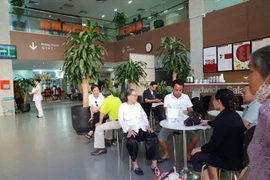Hanoi (VNA) – Early diagnosis, treatment and management ofnon-communicable diseases like hypertension and diabetes at communal medicalstations were updated at a training course workshop for lecturers major in thefield held in Hanoi on June 11.
The event, the second of its kind organised by the Ministry of Health incollaboration with the World Health Organisation (WHO), aimed to strengthenhealth care at the grassroots level, and reduce workload at central hospitals.
Accordingto Deputy Minister of Health Pham Le Tuan, statistics in 2015 showed that in Vietnam, only 43.1 percent of high blood pressure patients were diagnosedand 13.6 percent were treated in medical stations. Meanwhile, 31.1 percent ofdiabetes patients and 28.9 percent were diagnosed and treated, respectively.
The Health Ministry issued Decision No.2559/QD-BYT dated April 20, 2018 on themanagement of hypertension and diabetes in line with the family medicineprinciple at communal health stations for 2018-2020. Accordingly, theorganisaiton of training courses for regional lectures in the field is put atthe first line of the plan.
However, Tuan said that local authorities and health departments must involvein the model so that it can be carried out in 11,000 communal infirmaries nationwide.
WHO chief representative in Vietnam Kidong Park said that better management ofnon-communicable diseases must be accompanied with enhancing capacity of hospitalsat grassroots level.
High blood pressureand diabetes could be easily diagnosed and treated at grassroots medicalstations, which helps prevent the risks of cardiovascular in the country, headded.
Under Resolution No.20-NQ/TW dated October 25, 2017 by the Party CentralCommittee on the protection, care and improvement of public health in the newsituation, 95 percent of medical stations in wards, communes and townships willprevent, manage and treat several non-communicable diseases by 2025 and the ratewill reach 100 percent by 2030. -VNA






























